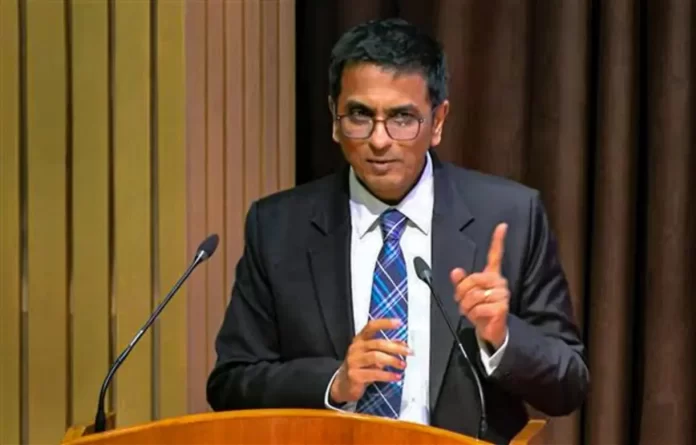Autonomy from popular sentiment underpins impartiality of judiciary: CJI Chandrachud in Bhutan
Chief Justice of India DY Chandrachud has observed that autonomy of the judiciary from popular sentiment underpinned its impartiality.
Speaking at the Bhutan Distinguished Speakers’ Forum/JSW Lecture Series on Wednesday, the CJI said in India, judges were appointed independently of public opinion, the autonomy of the judiciary from popular sentiment underpinned its impartiality.
This autonomy, however, needed a careful commitment to transparency and accountability, ensuring that the public continued to perceive the judiciary as fair, just and relevant.
He said while the Constitution and statutes were enacted in the name of the people, judges must apply the letter and spirit of the law with clinical detachment from popular morality.
Terming public trust as an essential ingredient for any judicial institution to function effectively, the CJI said this concept has guided the Supreme Courts of both India and Bhutan to act as an intermediary between the government and the people.
The onus lies on the Apex Courts of the two democratic countries to bolster public trust in the judiciaries of their respective countries. They have to ensure mediation between the obligations of the States towards their citizens and the mutual rights of individuals within the society.
Extending beyond mere obedience to court orders, public trust pertained to the public’s perception of the judiciary as a reliable, impartial and accessible institution, he added.
He observed that while legitimacy was a court’s moral right to command obedience or allegiance, public trust was the broader function of the courts as public-oriented institutions.
Speaking about the ‘foundational role’ of constitutional accountability in a democracy, the CJI said democracy was not just about numbers, it extended far away from beyond electoral majorities.
As per the CJI, while popular majorities defined the power to be in governance, the task of ensuring democratic accountability was a wider constitutional project.
Speaking on the theme “Judicial Legitimacy through Accessibility, Transparency, and Technology: The Indian Experience,” the CJI
said the Supreme Court of India, described as one of the most powerful constitutional courts in the world, shouldered this heavy obligation towards the people of the country, of maintaining a balance between the Constitution and democracy.
He said constitutionalism was based on the desirability to be governed by the rule of law rather than arbitrary legal systems, which manifested itself in the wide-ranging powers of the Supreme Court.
He further spoke about the role played by the top court of India in adjudicating issues such as the distribution of resources, which, while managed by the government, often came under judicial scrutiny to ensure fairness.
The CJI said the judicial bodies were tasked with the responsibility of giving effect to constitutional equity. Their role was not to hold the resources, but to scrutinise their distribution to ensure these resources aligned with the constitutional guarantees of fairness and equality.
Speaking about technological advancements shaping the Indian judiciary, the CJI highlighted the E-Courts Project, launched in 2007 to streamline case filing and court proceedings, which helped digitalisation of India’s justice delivery systems, increasing accessibility and efficiency of the Indian judiciary.
He said the facility of filing cases at the click of a button through the e-filing platform and the digital case management system (CMS) have drastically reduced the need for physical paperwork.
CMS was the world’s largest open-source judicial database, which sent automated updates on case progress via email and WhatsApp, keeping litigants informed and engaged in their legal journeys, explained the CJI.
CMS was not only an efficient cost-saving system, but it has also facilitated effective communication with litigants.
Virtual courts and hybrid hearings have further extended accessibility, enabling participation from remote regions and accommodating individuals who may be otherwise physically constrained, he added.
He said during the Covid-19 lockdowns, these tools proved invaluable, expanding access for pregnant women, elderly individuals, and people with disabilities. They also helped in overcoming the massive geographical limitation faced by litigants from smaller pockets of the country.
The CJI noted that transparency was the key ingredient in fostering public trust. The Supreme Court of India has embraced live-streaming of significant constitutional cases to increase public engagement. By broadcasting these proceedings on YouTube, the court invited the public to witness judicial deliberations firsthand, he added.
Terming Sunlight as the best disinfectant, the CJI said it also helped in keep the house in order, serving as an internal check on the functioning of courts across the country.
Sunlight ensured that the institutions were better-managed and used their resources effectively. Measures such as live-streaming have helped foster internal efficiency, accountability and institutional stability, he added.
Speaking about the backlog in Indian courts, the CJI said the Supreme Court was actively implementing solutions to tackle this issue. The National Judicial Data Grid (NJDG) and iJuris have provided transparent data on case backlogs and infrastructure needs at the district courts, enabling better resource allocation and more effective management.
Noting that the outcome of cases was rarer than process-stuck people in the courts, the CJI said the constitutional journeys mattered as much as the constitutional outcomes. By reducing barriers, simplifying procedures, and expanding technological access, the Supreme Court aimed to make the judicial process more inclusive and fairer, he added.
Reflecting the shared constitutional journey of India and Bhutan, the CJI highlighted the transformative influence of Dr BR Ambedkar on Bhutan’s legal framework. He hailed Bhutan’s swift adoption of e-litigation during the pandemic and expressed hope for continued cooperation between the two nations.


